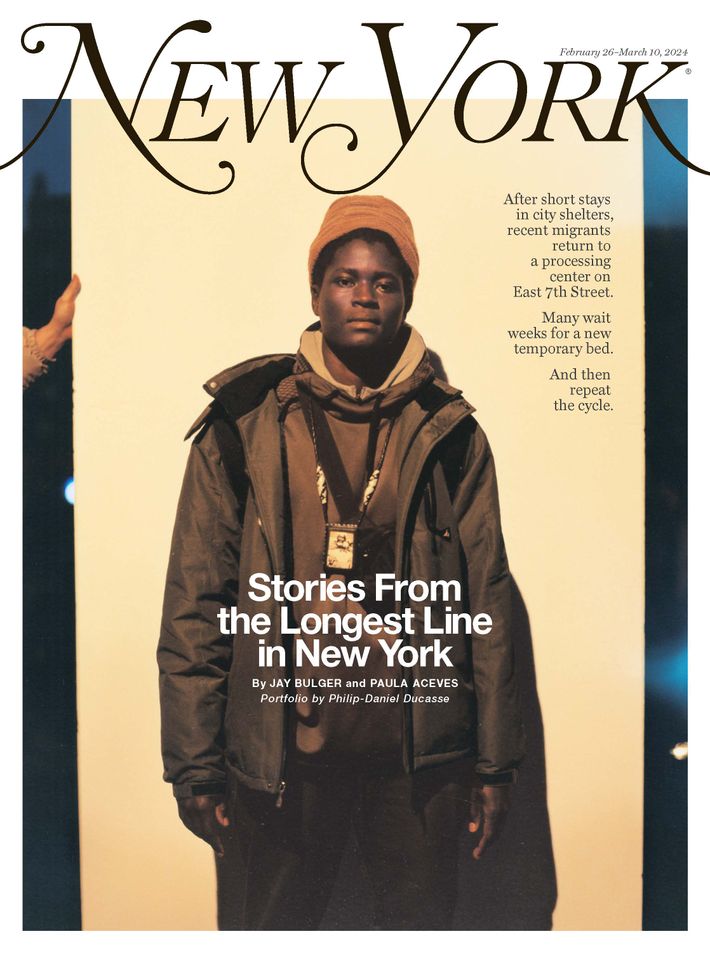1.
“In Line at St. Brigid,” February 26–March 10
For New York’s latest cover story, Jay Bulger and Paula Aceves spoke with dozens of migrants about their lives since arriving in New York. Many readers were moved by their stories of being forced to sleep on the streets while awaiting a spot in a shelter and the scarcity of food once they got there. @DebbelerN wrote, “The scale of human suffering and sadness reflected here is just immense,” while Daniel Endonino said, “This is who is on the human end of the draconian policies Biden and the Democrats are proposing in the ‘bipartisan border bill.’ ” Writer Justin Glawe said, “Excellent work here by New York mag to humanize the migrants ending up on the streets. Imagine if we just properly taxed the ultra wealthy and invested in immigrant communities. The last time we did that we became an economic powerhouse.” The story also prompted reflections on local government’s failure to handle the crisis. The New York Working Families Party tweeted, “Migrants went through incredible hardship to come to New York City. Ordinary New Yorkers are stepping up to help. But Mayor Adams’s failure of leadership has left many confused and suffering.” The nonprofit Jews for Racial & Economic Justice observed that Adams “is intentionally making seeking asylum and securing a bed in a shelter so difficult that some of our newest neighbors are considering returning to the danger they left behind.” “Very few articles in the press have humanized the experiences of our newest neighbors,” wrote New York City councilmember Shahana Hanif, who recently introduced a bill that would end shelter-stay limits and organized a rally for it a week after the story’s publication. “This coverage comes in good time.”
2.
“The Playwright vs. the Theater”
E. Alex Jung’s story “The Playwright vs. the Theater,” about Victor I. Cazares’s decision to stop taking their HIV medication until the New York Theatre Workshop calls for a cease-fire in Gaza, prompted widespread debate. Australian activist Drew Pavlou argued, “Dedicate your time and resources to getting food aid to Palestinians. Help raise money for people trying to escape the violence. So much more effective in every single conceivable way.” @weaselvontrapp said, “I saw a response linking this to the history of die-ins as a tactic used during the aids crisis, and I think that encapsulates what’s so frustrating about this sort of thing — in this comparison, the US government and big Pharma have become … New York Theatre Workshop??” Rachel Jamison, director of Protect a Volunteer, asked, “Was it always a thing that people protested until organizations with zero power took a stance they agreed with or is this a new thing? There’s so much energy directed at universities, city councils, and random other organizations and none of them can do anything.” On Instagram, Susie Cantar-Cohen said, “To think so many people desperately needed life saving AIDS medication and had no access … To sit here and not take the meds is actually doing NOTHING good for Palestine … It’s a grotesque display of privilege.” Michael R. Jackson, the playwright behind the Tony-winning Broadway musical A Strange Loop, was especially critical: “Shame on Vulture for amplifying this sickness (I use that word advisedly) when so many in the theater world have died because of this horrible disease, and two specifically that we could name within the last few years. The madness and narcissism that has taken over the art/theater world (and the world in general) in the name of politics is truly one of the saddest and angry-making things I’ve seen in a long time.” Jackson’s continuing tweets drew their own backlash. “Framing Vulture’s piece as ‘cheering it on’ fundamentally misunderstands the response to Victor’s decision,” Michael Cuby, an editor at Them, wrote. “Standing in solidarity isn’t about ‘cheering.’ We’re in the middle of a genocide. No one is ‘cheering.’ ” Caio C. Major said, “A lot of the reactions I’ve seen to the protests of Victor Cazares and Aaron Bushnell make me think that the first instinct for many on the western left has become to scold, to pick apart, to diminish, and they have no second instinct beyond that.” Others viewed Cazares’s protest in the context of a wider disregard. @beets_tv lamented “the amount of comments that don’t understand what protest means anymore. None of these people stand for anything, and when they see protest they just call it narcissistic.” Madeleine Salvatore added, “I think amidst so many of us feeling so desperately powerless about the carnage in Gaza, this protest actually makes sense. I don’t think it’s narcissistic. I think it’s pure desperation. Those of us that care deeply about Gaza get it. I get it.”
Send correspondence to comments@nymag.com. Or go to nymag.com to respond to individual stories.

